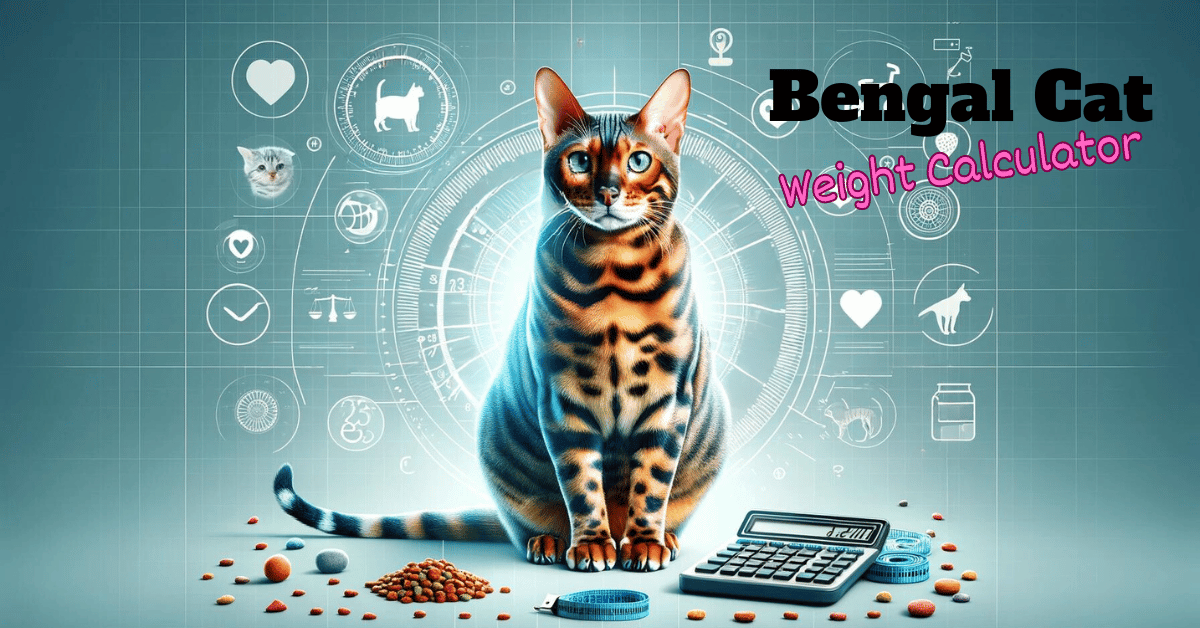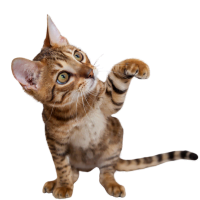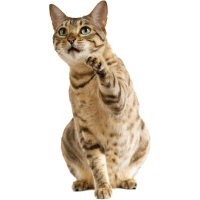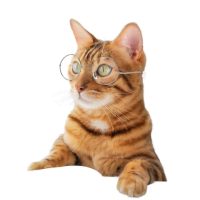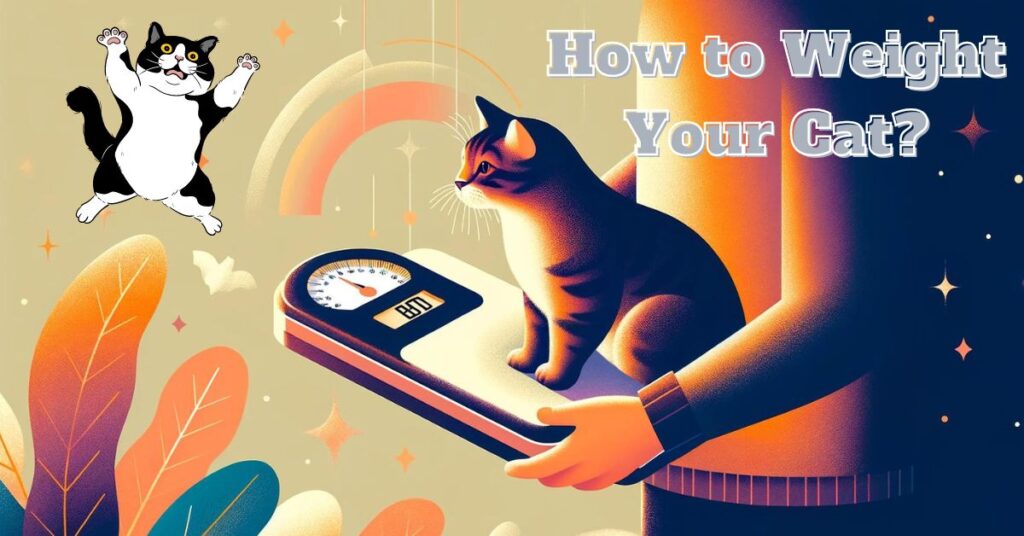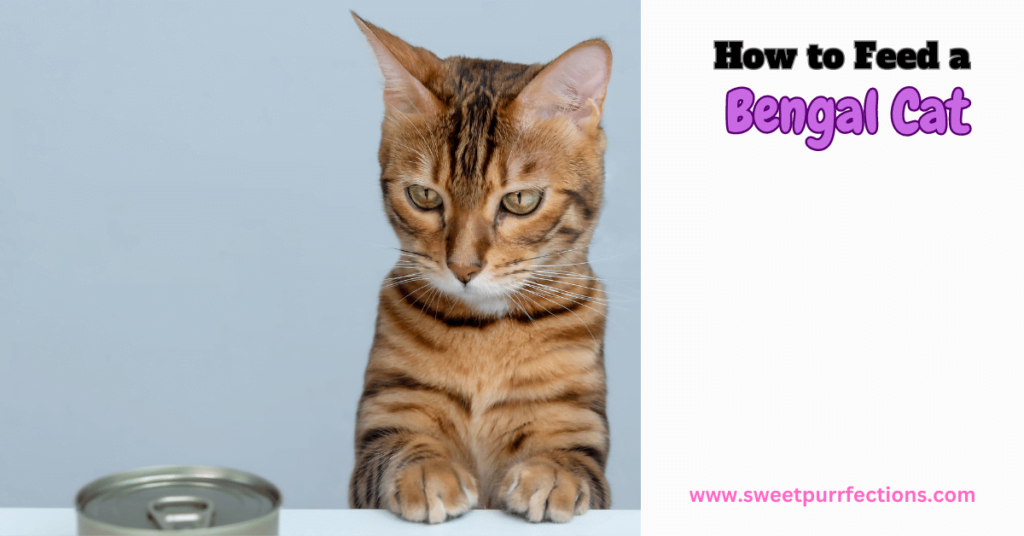Quick Guide to Using the Bengal Cat Weight Calculator
- Choose Your Unit: Click the Lbs or Kgs button to select your preferred measurement unit. The active unit will be highlighted.
- Select the Sex: To ensure an accurate weight calculation, select your Bengal’s sex from the dropdown menu—male or Female.
- Enter Age: Use the fields for weeks, months, and years to input your cat’s age. Accurate age helps in precise weight estimation.
- Calculate: The tool quickly computes and displays your Bengal’s estimated weight range based on age and sex.
Bengal Cat Weight Calculator
Bengal Cat Weight Averages: What to Expect
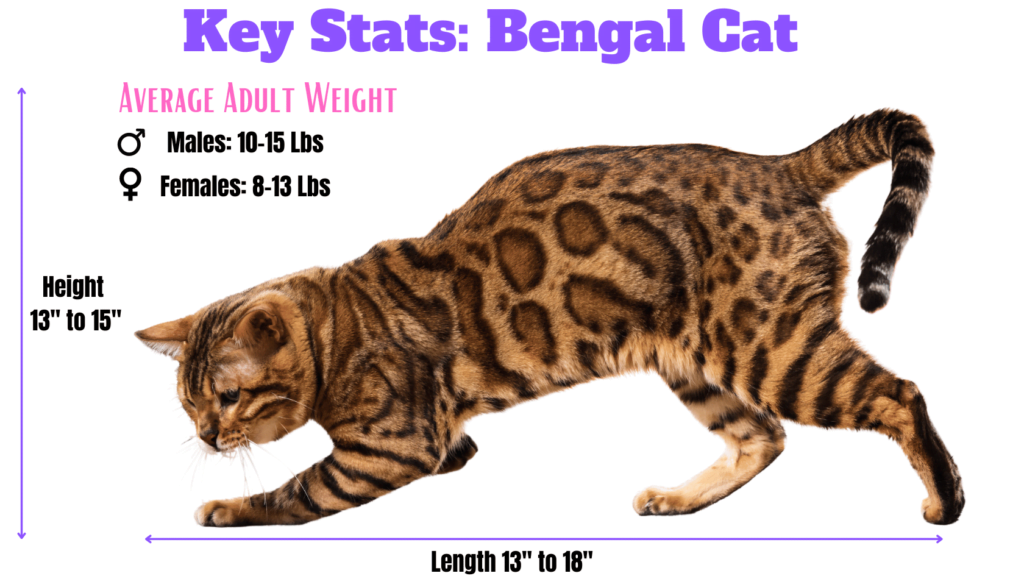
Bengals typically weigh 10 to 15 pounds for males and 8 to 13 pounds for females. Compared to typical domestic cats, they are leaner, with rather broad chests and longer back legs.
But wait, there’s more! Being the active and muscular felines, Bengals tend to have a slimmer gap of around 2 pounds between males and females. However, remember that every cat is a unique, whiskered individual, and there are always exceptions to the rule.
When it comes to growth, Bengals usually reach their full size by around 18 to 24 months of age, with an average length of 13 to 18 inches and a height of 13 to 15 inches
It’s important to remember that these figures aren't set in stone. Think of them as general guidelines to give you a paw-spective on what’s typical.
Factors Influencing Bengals Growth and Weight
Are you curious about the size and heft of your Bengal compared to the fluff-ball next door? Several factors can influence the weight and growth of your beloved Bengal cat. Let’s dive into what shapes your Bengal's physique:
- Genetics: It's all in the genes! Like a family recipe, your Bengal's genetic makeup, inherited from their parents, is crucial in determining their size.
- Diet: Quality food equals a healthier cat. Just like us, what they eat determines how they grow. A nutritious, well-balanced diet keeps them in tip-top shape.
- Exercise: Bengals are naturally active and playful. Regular play helps them burn off excess energy and keeps their muscles strong and lean.
- Breed and Crossbreeding: Crossbreeding can influence size and traits, potentially leading to a smaller stature if mixed with other breeds.
- Runt of the Litter: Runts often grow slower due to early disadvantages in competing for food and mother’s care.
- Health Status: Just like us, it can affect their weight if they’re feeling under the weather. Worms or thyroid issues must be checked to keep them healthy.
- Age: Young cats are full of energy, burning calories quickly as they grow. As they mature, their metabolism may slow, possibly leading to weight gain, so reducing treats can help maintain their weight. However, it's generally not a concern if a mature cat loses a small amount of weight.
- Spaying/Neutering: Cats might gain a few pounds after being spayed or neutered.
Understanding Weight Fluctuations in Bengal Cats
When using our Bengal Cat Weight Calculator, you might notice that your feline friend’s weight occasionally swings outside the suggested range.
While some variance is normal, significant deviations—above or below the norm—can signal that it’s time to check in with your vet.
Why Weight Watch Matters
Bengals are naturally active and muscular cats, so it's crucial to monitor their weight. An overweight Bengal might just need a tweak in their daily calorie intake or more playtime, but it could also indicate underlying health issues like diabetes or joint stress.
On the flipper side, an underweight Bengal might not be absorbing nutrients properly or experiencing metabolic or dental problems that only a professional can diagnose.
Beyond the Scale: The Importance of Body Condition Scoring
Weight alone isn’t the best measure of health; that's where body condition scoring comes in. This technique helps you assess whether your cat is too skinny, just right, or overweight by looking at its physical shape and palpating its ribs and fat layers.
A good body condition score shows that your Bengal is not just at an ideal weight numerically but is also healthy physically.
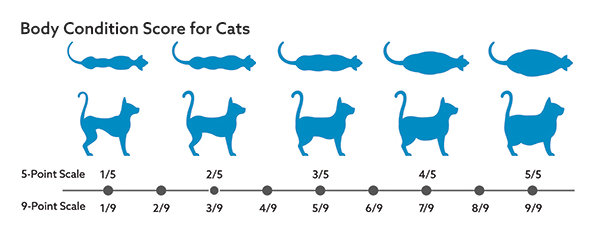
Bengal Cat Weight Control: Comprehensive Guide to Diet and Exercise
Not all the weight factors of a Bengal cat are within our paws to change, but thankfully, some of the most crucial ones are. Let’s pounce on how you can actively contribute to the health and happiness of your energetic Bengal!
Diet: Fueling the Feline Dynamo

Bengals aren't your typical couch potato felines; these energetic whirlwinds need significantly more fuel than the average kitty. To keep their energy tanks properly filled without overdoing it, a Bengal cat typically requires about 25-30 calories per pound of body weight daily.
This helps maintain their high-energy antics without the risk of tipping the scales. Despite their active lifestyles, it’s still possible for Bengals to pack on the pounds if they are overfed.
Always choose a raw cat diet or premium wet commercial food with real meat as the primary ingredient—duck, chicken, or rabbit. These protein-rich options provide the essential amino acids for muscle development and overall health.
Pro Tip: Use smart feeders that can precisely control the food portions they receive, ensuring they’re just right.
Exercise: Play Hard, Grow Strong
Bengal Cats require more exercise than other cats. As a rule of thumb, a minimum of one hour of exercise per day is essential, split between play with you and solo play.
- Interactive Play: Choosing toys that cater to the needs of Bengal cats helps satisfy their natural hunting instincts and keeps them physically agile.
- High Places: Bengals love to reign from above. Installing perches and cat trees in your home allows them to survey their kingdom from the best vantage points, giving them the physical and mental elevation they crave.
- Leash Walks: Leash training can be a great way to explore the outdoors together safely. It provides mental stimulation and physical exercise and is perfect for Bengals who crave adventure.
- Swimming: Some Bengals even enjoy a good swim! If your cat likes water, occasional swimming sessions can be a wonderful exercise form, engaging different muscle groups than they use when running or jumping.
- Cat Wheels: Consider investing in a cat exercise wheel to let them burn off that extra energy indoors. It's a fantastic way for your Bengal to stay fit and entertained, even when you're not around to play.
Health: More Than Just a Vet Visit
Keeping your Bengal in top shape means regular check-ups and being proactive about their health needs:
- Routine Care: Regular visits to the vet can catch any sneaky health issues early, ensuring your Bengal stays in peak form.
- Mental Health: Bengals are sharp cookies. They thrive on interaction and mental challenges, so incorporating puzzle feeders and complex toys can keep their minds as sharp as their claws.
Remember, Bengals aren't your everyday lap cats. These clever companions are highly interactive and constantly seek engagement—they're a dynamic part of your family that will always keep you on your toes!
Final Thoughts: Keeping Your Bengal at Its Best
Thank you for tuning in to our comprehensive guide on maintaining the ideal weight for your Bengal cat using our Bengal Cat Weight Calculator.
Remember, understanding your Bengal’s health needs goes beyond monitoring their weight. It includes observing their behavior, adjusting their diet and exercise routines, and regularly consulting with a veterinarian to ensure optimal health.
Use our calculator as a tool to keep your Bengal thriving and to catch any potential issues early. Here’s to many joyful, healthy years with your spirited Bengal companion!

